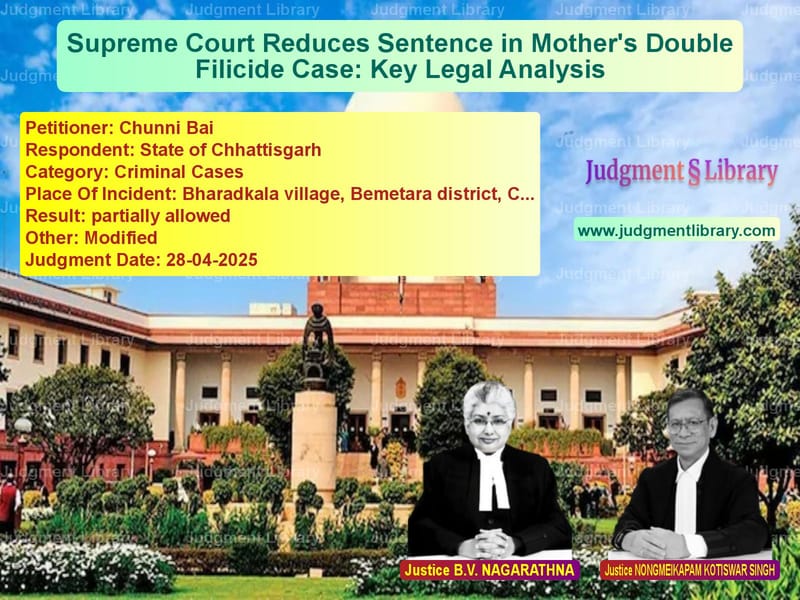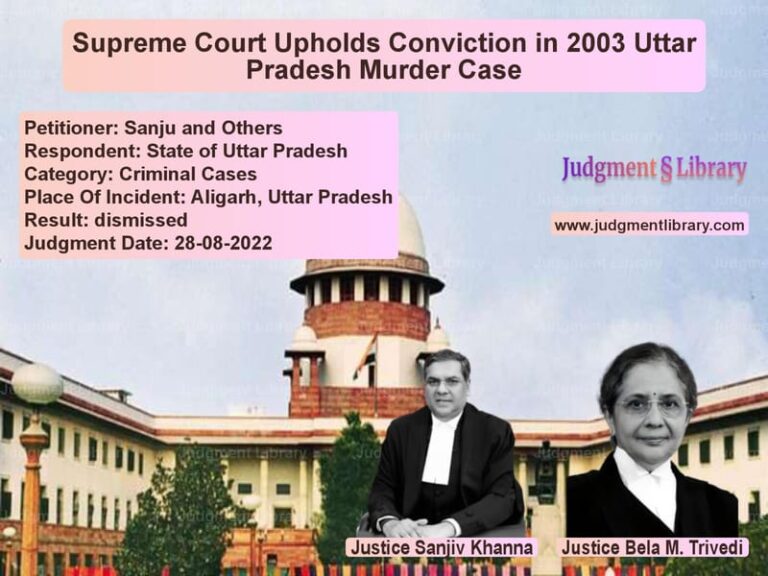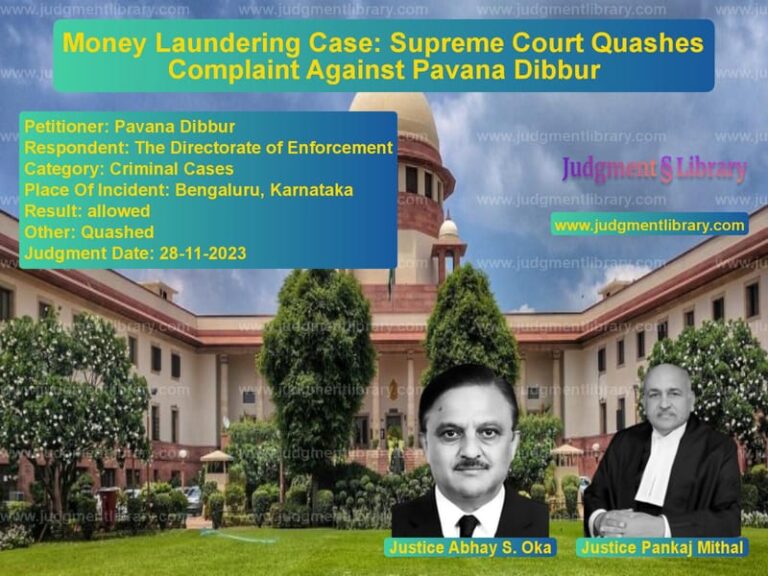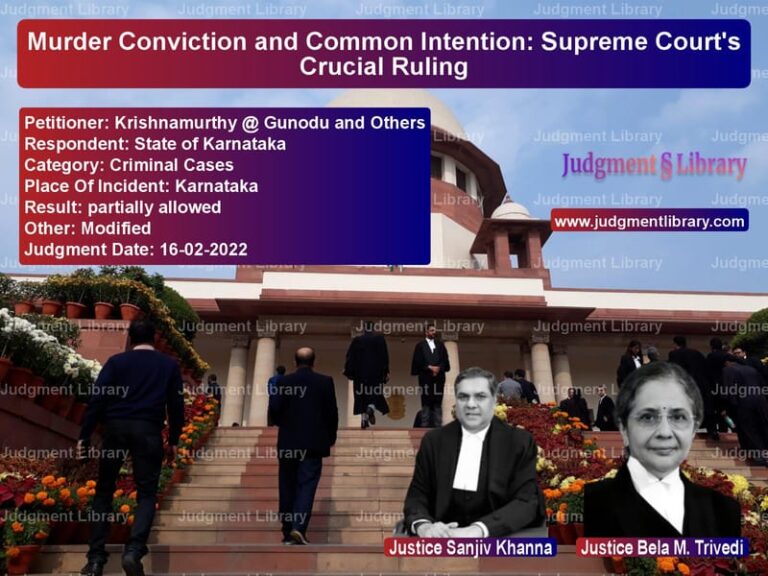Supreme Court Reduces Sentence in Mother’s Double Filicide Case: Key Legal Analysis
In a landmark judgment delivered on April 28, 2025, the Supreme Court of India partially allowed the appeal of Chunni Bai, a mother convicted for killing her two young daughters, by reducing her conviction from Section 302 (murder) to Section 304 Part II (culpable homicide not amounting to murder) of the Indian Penal Code. The case, Chunni Bai vs. State of Chhattisgarh, raised crucial questions about criminal intent, mental health considerations in criminal law, and the distinction between murder and culpable homicide.
The Facts of the Case
The tragic incident occurred on June 5, 2015, in Bharadkala village, Bemetara district, Chhattisgarh. Chunni Bai was accused of assaulting her two daughters – Yogita (5 years) and Nisha (3 years) – with an iron crowbar, causing fatal head injuries. The prosecution’s case relied heavily on the eyewitness account of Sonam Sahu (PW-1), the appellant’s sister-in-law, who testified that she saw Chunni Bai hitting the younger child with the weapon while the elder lay unconscious, soaked in blood. The postmortem reports confirmed brutal head injuries as the cause of death.
The trial court convicted Chunni Bai under Section 302 IPC and sentenced her to life imprisonment, which was upheld by the Chhattisgarh High Court. The appellant’s defense centered on her claim that she was “under the influence of some invisible power” during the incident, suggesting a possible mental health condition.
Supreme Court’s Analysis
The Supreme Court bench comprising Justices B.V. Nagarathna and Nongmeikapam Kotiswar Singh undertook a meticulous examination of the evidence and legal principles involved. The Court noted:
“When a person performs an act, he is attributed with the intention to cause the natural consequences that follows from the act performed… However, it can be illusive when intention is not clearly spelt out or discernible, and the same has to be gathered from the surrounding facts and circumstances and the acts of the accused.”
The judgment extensively discussed the distinction between murder and culpable homicide, citing precedents like State of A.P. v. Rayavarapu Punnayya and Rampal Singh v. State of U.P. The Court observed that while the act of homicide was proven beyond doubt, the crucial question was whether Chunni Bai had the requisite intention to commit murder.
Key Legal Principles
1. Mens Rea in Homicide Cases: The Court emphasized that intention is the most important facet of mens rea in murder cases. It noted several factors that cast doubt on Chunni Bai’s intention:
– The appellant’s immediate remorse and repeated admissions of killing her children
– Complete absence of motive (all witnesses testified she loved her children)
– No evidence of domestic discord or financial stress
– The bizarre nature of the crime (a mother killing her beloved children)
2. Mental Health Considerations: While the Court acknowledged that Chunni Bai couldn’t conclusively prove insanity under Section 84 IPC, it gave weight to her claim of being under “invisible influence”:
“In the peculiar facts and circumstances as revealed in the present case… the possibility of confusing her unstable mental condition or temporary lapse of judgmental power bordering on temporary insanity cannot be completely ruled out.”
3. Judicial Responsibility in Bizarre Cases: The Court criticized the lower courts for not adequately investigating the mental health angle, noting:
“If such circumstances emerge in course of the trial which remain inexplicable and bizarre as in the present case, the court… should ask such questions to the witnesses, as may be necessary to elicit the truth.”
Conclusion
The Supreme Court concluded that while the act of homicide was proven, the prosecution failed to establish the intention required for murder. The Court held:
“We are satisfied that in the present case ‘intention of causing death’ cannot be said to have proved… the present case falls within the third category of ‘culpable homicide of the third degree’.”
Considering Chunni Bai had already served 9 years and 10 months in custody (nearly the maximum 10-year sentence under Section 304 Part II), the Court ordered her immediate release. The judgment serves as an important precedent in cases involving potential mental health issues and the need for thorough judicial inquiry into the circumstances surrounding inexplicable crimes.
Petitioner Name: Chunni Bai.Respondent Name: State of Chhattisgarh.Judgment By: Justice B.V. NAGARATHNA, Justice NONGMEIKAPAM KOTISWAR SINGH.Place Of Incident: Bharadkala village, Bemetara district, Chhattisgarh.Judgment Date: 28-04-2025.Result: partially allowed.
Don’t miss out on the full details! Download the complete judgment in PDF format below and gain valuable insights instantly!
Download Judgment: chunni-bai-vs-state-of-chhattisgar-supreme-court-of-india-judgment-dated-28-04-2025.pdf
Directly Download Judgment: Directly download this Judgment
See all petitions in Murder Cases
See all petitions in Judgment by B.V. Nagarathna
See all petitions in Judgment by N. Kotiswar Singh
See all petitions in partially allowed
See all petitions in Modified
See all petitions in supreme court of India judgments April 2025
See all petitions in 2025 judgments
See all posts in Criminal Cases Category
See all allowed petitions in Criminal Cases Category
See all Dismissed petitions in Criminal Cases Category
See all partially allowed petitions in Criminal Cases Category







